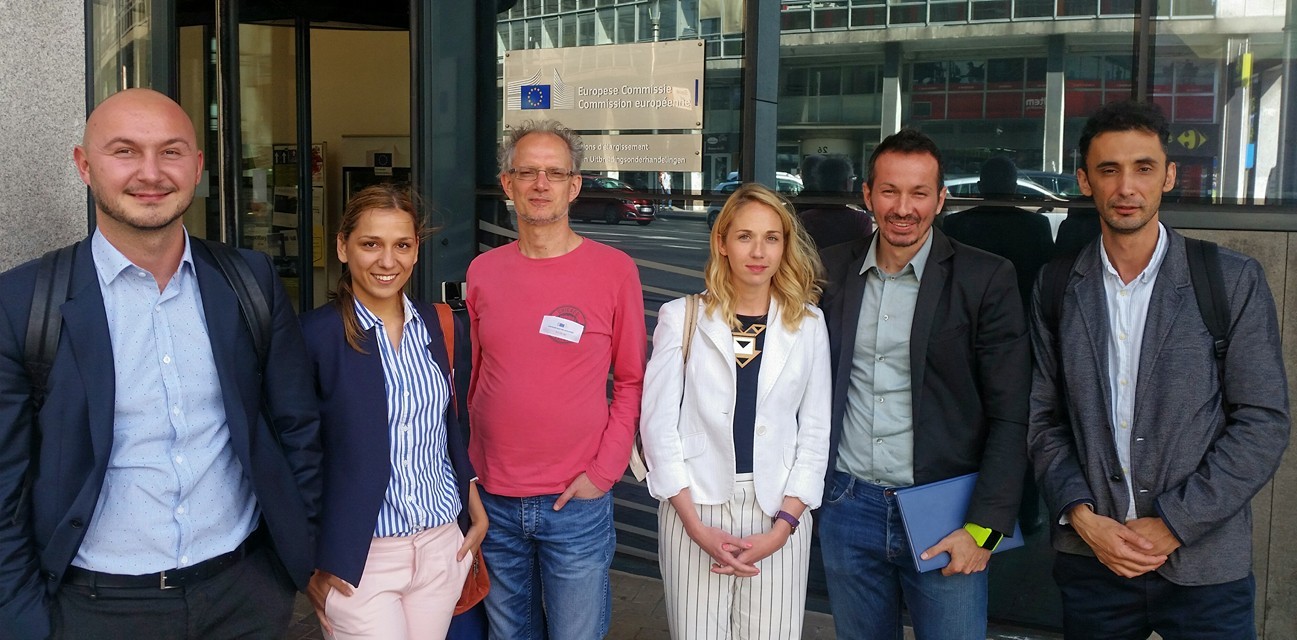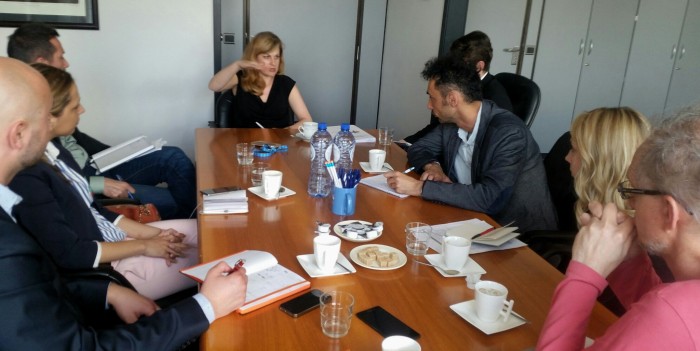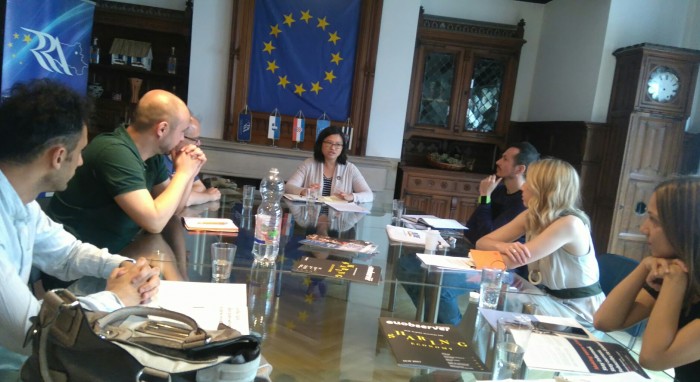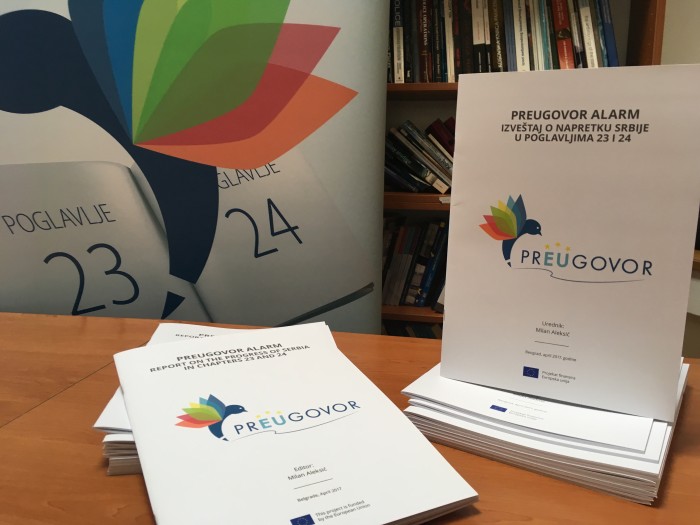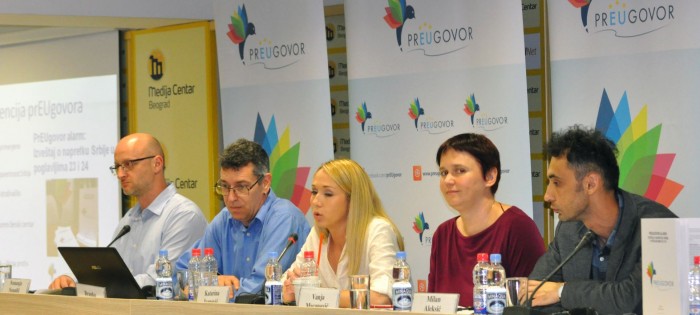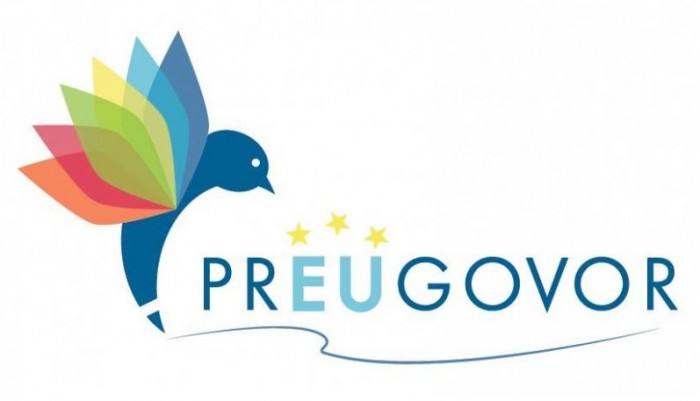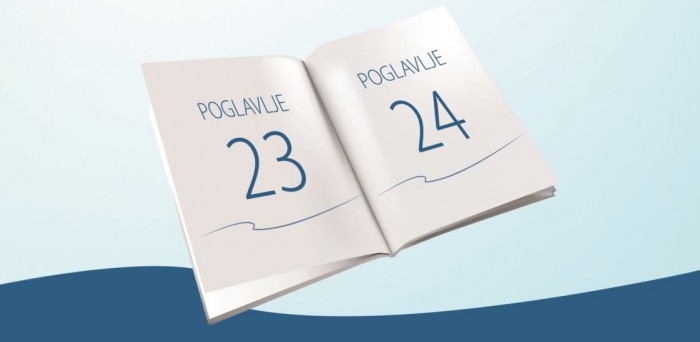The results of the implementation of policies within chapters 23 and 24 were the topic of talks between coalition prEUgovor delegation and representatives of EU institutions, research centers and the media during their visit to Brussels on 5 and 6 June 2017.
At the meeting with the three-member delegation from the Directorate General for Neighborhood Policy and Enlargement Negotiations (DG NEAR), representatives of the coalition prEUgovor presented the main findings on progress of Serbia in Judiciary and Fundamental rights (Chapter 23) and Justice, Freedom and Security (Chapter 24) published in the latest Alarm Report. Representatives of the European Commission assessed that the opening of chapters contributed to accomplishments in these areas in Serbia, and pointed out that for the closing of these chapters concrete evidence about the effects of reform will be needed, not just the formal „ticking off” of planned activities. As positive was estimated that, due to the Action plans, now there is a clearer picture of what will Serbia do in order to promote judicial reform, human rights, the fight against corruption, which wasn’t the case before the negotiations on membership in the EU.
Although it was pointed out that since the opening of negotiations the work of the institutions responsible for the implementation of reforms under chapters 23 and 24 was more transparent, representatives of the EC and prEUgovor estimated that it still not transparent as much as the EU and civil society would want it to be. Priority for the negotiations in the coming period was defined as fight against high-level corruption, ie. fight against political corruption. At the meeting it the necessity of improvement of the of the Government of Serbia’s reporting on the implementation of action plans was emphasized, as it was written in rEUformator.
The topic of discussion was also the relationship of the government with the civil society in Serbia. The EC representatives have stressed that civil society is an important part of the negotiation process and that they expect the inclusion of CSOs in the implementation of certain activities from the action plans for chapters 23 and 24. In addition, they pointed out that civil society organizations have a key role as independent observers and promoters of changes, which will improve the implementation of certain policies.
CIVIL SOCIETY FOR IMPROVEMENT OF RELETIONS IN THE REGION
Very interested in developments in Serbia is also Laura Trimajlo, assistant of Eduard Kukan, Member of the European Parliament and Chairperson of the Delegation of the EU-Serbian Committee for Stabilization and Association. She has emphasized that she monitors the implementation of reforms in Serbia on a daily basis, as well as the fulfillment of conditions for opening and closing of the chapters. It was estimated that it is difficult to find a balance of praise for what has been done in the context of EU membership negotiations, and at the same time realistically assess the progress made in the field. Among the priorities for Serbia in the coming period, adoption of the Law on Asylum and Temporary Protection and the new Foreigners Act, as well as improvement of relations with neighbors were specified. It was pointed out that greater engagement of civil society organizations in creating solutions to bilateral problems, that increasingly affect the whole process of European integration, was needed.
During this visit to Brussels, a meeting with the media organizations took place, during which prEUgovor representatives gained a better insight into the editorial policy and the functioning of the portal EU Observer, and the work of media correspondents from Serbia. Few media in Brussels are dealing with the events from Serbia or from the Western Balkans, and there are fewer and fewer correspondents in Brussels, it was concluded during this discussion. Security and democracy are topics that are most often covered in the articles that report on Serbia, and migrations are, after Brexit, a topic that the public in Brussels is most interested in. It was pointed out during the discussion that the criticism of the accession process at this time receives coverage, because the current situation isn’t satisfactory, and that it is necessary to explain why the impact of the EU does not contribute to the betterment of the applicant countries, as well as to suggest how to improve the process of accession.
Coalition prEUgovor Project Coordinator Bojan Elek has presented the findings of the report during the conference "The crisis of democracy in the Western Balkans", which was organized by the Foundation for Open Society’s Institute for European Policy on 7 June. In a discussion with representatives of European institutions and decision-makers interested in the region and the EU enlargement policy, Elek pointed out the achievements and results of the reforms in the rule of law in Serbia.
"While the EU strives to keep alive and restore the credibility of the enlargement process, we have witnessed very limited progress on key reforms that should move Serbia closer to European standards. Instead of a gradual harmonization of legislation and the adoption of best practices from the EU, Serbia is mimicking democracy, and the progress in reforms is all about fulfilling technical and procedural requirements, while the concrete benefits for citizens at this time is negligible", said Elek.
The prEUgovor delegation in this visit to Brussels consisted of Katarina Ivanovic from ASTRA - Anti trafficking Action, Bojan Elek and Radomir Cvetkovic from Belgrade Center for Security Policy, Bojana Bosanac from the Center for Investigative Journalism of Serbia, Milan Aleksic from the Center for Applied European Studies, Siniša Volarevic from Group 484 and Rade Djuric from Transparency Serbia, while the Autonomous women's center representative has participated in Brussels at a public conference on prevention of violence against women and girls.
This visit to Brussels is a part of the project "prEUgovor Policy Watch: Monitoring Reforms in Chapters 23 and 24". The project is funded by the European Union.
